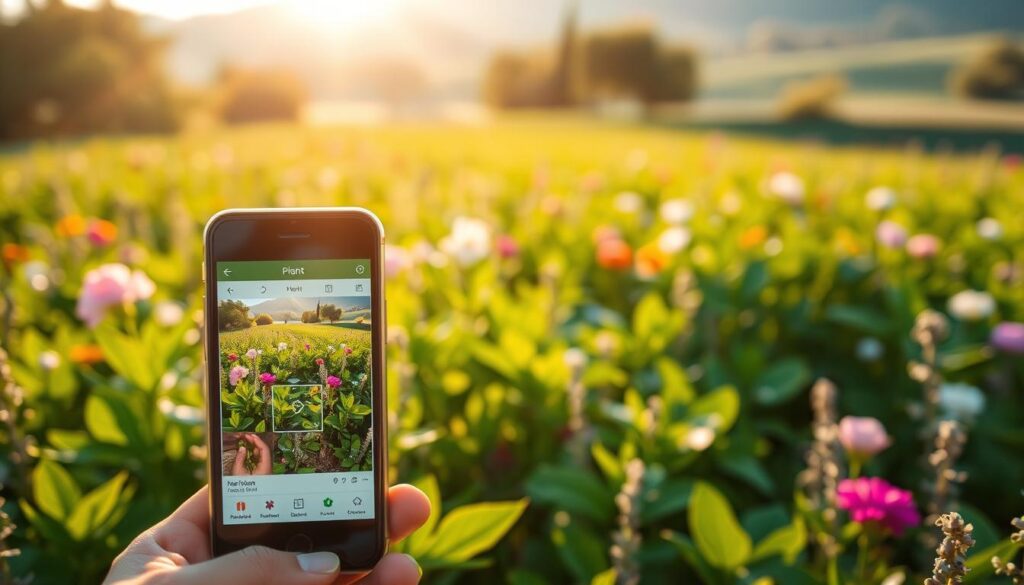Want to Learn More About Plants?
Free plant identification apps have changed how we connect with nature. They help gardeners, travelers, and nature lovers identify plants quickly. Thanks to smartphone tech, identifying plants is now easy for all. These apps offer lots of info. They help users improve their gardening, love nature more, and connect deeper with the environment.

Seek App
Introduction to Plant Identification Applications
Plant ID apps have totally changed how we connect with the outdoors. With new technology, people can just snap a photo of a plant. They then get to know what it is right away. It’s like a blend of gardening with tech, making learning about plants easy for everyone.
These apps are great for all gardeners, whether you’re just starting or you’ve been at it for years. They tell you all about different plants, how to take care of them, and why they’re good for the planet. This surge in their use shows us people want to live more sustainably and know more about nature. These tools also help save plants and teach us more, helping us all value our world’s diverse life more.

Why Use Free Apps to Identify Plants
Technology has introduced tools that improve our connection with nature. Free apps for identifying plants are now widely used. They benefit both beginners and expert plant lovers. With these apps, getting detailed info on plants through phones or tablets is easy. This makes gardening more fun for everyone.
Convenience and Accessibility
Gardening apps are super convenient. With them, you can snap a picture of a plant and know what it is right away. You don’t need to be an expert in plants to use these apps. They come with features like interactive databases. This means you can learn about different plants and feel closer to nature.
- Instant identification for a variety of plant species.
- User-friendly interfaces suitable for all ages.
- Educational resources that enhance gardening knowledge.
Contribution to Citizen Science
These apps do more than just identify plants. They get users involved in citizen science. When you share what you find, you help with big research projects. This makes everyone part of taking care of the environment. Our shared data helps scientists understand more about nature, how ecosystems work, and the effects of climate change.
PlantNet: The Top Pick for Identification
The PlantNet app is the top choice for identifying plants. It’s fast and accurate, perfect for anyone interested in plants. It can recognize different plants in just five seconds.
Quick and Accurate Identification
PlantNet is known for its quickness and accuracy. It uses a big database to give reliable results. It’s great for identifying plants fast, anywhere from gardens to forests.
User-Friendly Experience
PlantNet is also easy to use. Its simple design lets users find their way around easily. There are no annoying ads. It also lets people help with science studies on plants. This is great for teachers and anyone interested in nature and saving the environment.
iNaturalist: Best for Community Engagement
The iNaturalist app is a top choice for connecting people. It lets users exchange plant sightings. This app creates a space for beginners and experts to work together. It builds a lively group of nature fans. Using the iNaturalist app helps people learn about nature and meet others with the same interest.
Sharing Observations and Expertise
The iNaturalist app’s key feature is sharing plant sightings. When users post pictures of plants, they help build a useful database. This database is good for identifying plants and for research. With help from experienced botanists and nature fans, users get better at identifying plants. This sharing turns single observations into collective knowledge. It boosts learning and involvement in the community.
Participating in Citizen Science Projects
The iNaturalist app gets users into citizen science projects. These projects collect important data on nature. By joining, people help with scientific research. This makes understanding nature deeper. The app allows users to not only share plant sightings but also to help with important studies. Being part of these projects shows how valuable community help is in learning more about nature and saving it.
PictureThis: Your Personal Plant Expert
The PictureThis app is perfect for anyone who loves plants or gardening. It can identify over 400,000 plant types with amazing accuracy. This impresses both newbies and pros in plant care. Just snap a photo, and quickly, you learn all about that plant. It’s a top tool for knowing your green friends.
Accurate Plant Identification
PictureThis is known for its high accuracy, over 98%! This is super important for gardeners wanting to care for the right plants. It’s like having a plant expert in your pocket. This app helps you learn and love more about plants.
Plant Disease Diagnosis and Treatment
The app is also great at spotting sick plants. Take a picture of a plant that looks unwell. Quickly, you get a diagnosis and ways to treat it. This means less guessing and healthier plants. PictureThis gives you all you need to take care of your plants well.
LeafSnap: Identifying Plants Visually
The LeafSnap app changes how we identify plants. It uses advanced algorithms to examine photos users upload. This helps accurately recognize lots of plant types. This new way of identifying plants makes learning about them fun and easy.
Leveraging Visual Data for Accurate Results
LeafSnap’s main feature is its use of visual data. It quickly and accurately identifies plants from images of their parts. Whether it’s leaves, flowers, or bark, the app uses the latest tech. This makes it easier for everyone, from beginners to experts, to identify plants.
Collaboration with Academic Institutions
The LeafSnap app gets better through working with schools. It teams up with universities and research places to improve its system. They use science-based info to grow its database. This partnership makes the app more trustworthy and educational for users.
Free Apps to Identify Plants: An Overview
Many free apps can help you identify plants. They come with cool features that make finding out about plants fun and easy. You’ll find apps with simple designs, huge lists of plants, and ways to connect with other plant lovers. These features make learning about plants through apps a great experience.
Different Features and Functionalities
Here are some cool things about plant ID apps:
- Big databases full of different plant species.
- Easy-to-use interfaces that make navigating a breeze.
- Options to keep track of the plants you find.
- Community forums that let you share tips and info.
This makes using the apps not just useful, but also really satisfying.
Comparing User Experiences
People usually like these apps because they’re accurate and easy to use. But sometimes, they run into issues like:
- Getting different results from different apps.
- Having technical problems that make the apps hard to use.
- Not finding enough information on certain plants.
Features like community support and feedback are super important. They help users feel good about the apps. Everyone’s experience helps us understand how well these apps work in identifying plants.
Exploring PlantSnap: A Newcomer in Plant Identification
The PlantSnap app is a new and innovative tool for identifying plants. It’s well-designed, making it easy for both newbies and plant lovers to identify various species. It lets people of all ages get into gardening smoothly.
User-Friendly Interface and Functionality
What makes this app popular is its ease of use. It’s simple to move around in the app and find what you need quickly. To identify a plant, you just snap a photo, and the app immediately suggests possible matches from its big database. This feature helps beginners and is great for learning.
Gaining Popularity Among Users
The PlantSnap app is becoming a favorite for gardening lovers and those into learning about plants. Its quick and accurate identification feature, along with a vast database of plants, attracts many users. With every download, PlantSnap’s reputation gets better. It’s earning a top spot in the world of plant identification tools.
The Importance of Quality Photos in Identification Apps
Quality images are crucial for successfully identifying plants with apps. Good photos help highlight important features like leaves, flowers, and fruits. By following good photography practices, users get better identification results and enjoy using the app more.
How to Take Good Photos for Better Identifications
Here are some top tips to take better plant photos for apps:
- Use natural lighting to prevent harsh shadows.
- Focus on the plant’s key features like leaves and flowers for clear shots.
- Take pictures from several angles to give a complete view.
- Include the plant’s surroundings if they provide helpful hints.
Common Mistakes to Avoid When Photographing Plants
Avoiding certain mistakes can greatly improve your photo quality. Steer clear of these common errors:
- Avoid taking photos in dim light as it hides details.
- Don’t let background distractions ruin your photo.
- Be careful with zoom; blurry images happen without a steady hand.
- Always clean your camera lens for the clearest photos.
User Reviews and Experiences with Plant ID Apps
User feedback is vital in judging how well plant ID apps work. By looking at what users say, we learn the good and the bad of each app. It’s amazing to see stories of how these apps help people find out about plants around them.
Case Studies and Success Stories
A lot of users share exciting stories of discovering plants. They talk about how apps like iNaturalist and PictureThis have deepened their knowledge of plants nearby. They love finding new plants and sharing them with others. These stories show how these apps make people more aware of nature’s diversity.
Common Challenges Faced by Users
But, using plant ID apps can sometimes be tough. Users often talk about getting the wrong plant names, especially for rare ones. And glitches can make identifying plants tricky, which can be annoying. Different phones and tablets can also make the app work differently for people. Fixing these problems could make these apps even better.
Conclusion
Exploring the world of plants has changed a lot because of tech. Apps like PlantNet, iNaturalist, and PictureThis are great for anyone interested in plants. They help you identify plants, figure out plant diseases, and help the environment too.
These apps will get even better with new tech developments. AI and machine learning will make them more accurate and easier to use. Plus, with more people contributing, these apps become even more valuable for learning and saving nature.
So, using these apps makes connecting with nature and learning about plants easier. It’s a great way to know more about the plants around you and protect the environment too.



